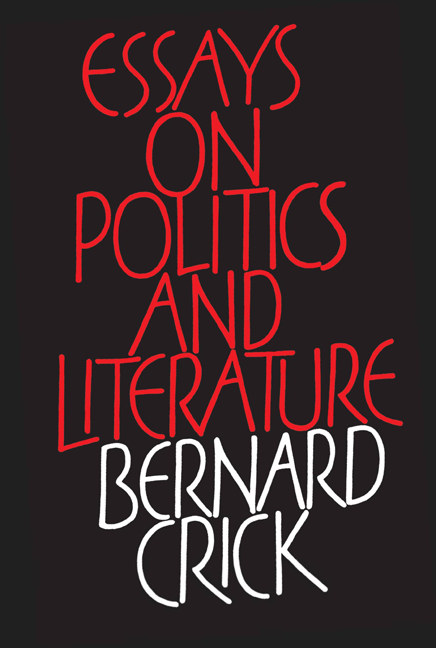Book contents
- Frontmatter
- Contents
- Preface
- Acknowledgements
- Foreword by David Daiches
- One Literature and Politics
- Two The Political in Britain’s Two National Theatres
- Three Young Writers of the Thirties
- Four Koestler’s Koestler
- Five Hannah Arendt: Hedgehog or Fox?
- Six Beatrice Webb as English Diarist
- Seven Words
- Eight My Lse
- Nine Reading The Observer as a Complex Text
- Ten On the Difficulties of Writing Biography and of Orwell’s in Particular
- Eleven Reading Nineteen Eighty-Four As Satire
- Twelve Animal Farm For Schools
- Thirteen Orwell and English Socialism
- Fourteen On the Orwell Trail
- Fifteen Wedekind’s Spring Awakening
- Sixteen Horvath’s Tales From the Vienna Woods
- Seventeen Pinter’s No Man's Land
- Eighteen Polly By Gaslight
- Nineteen Edgar Catches Jenkins’ Ear at the Barbican
- Twenty Barrault at the Barbican
- Index
Five - Hannah Arendt: Hedgehog or Fox?
Published online by Cambridge University Press: 24 September 2020
- Frontmatter
- Contents
- Preface
- Acknowledgements
- Foreword by David Daiches
- One Literature and Politics
- Two The Political in Britain’s Two National Theatres
- Three Young Writers of the Thirties
- Four Koestler’s Koestler
- Five Hannah Arendt: Hedgehog or Fox?
- Six Beatrice Webb as English Diarist
- Seven Words
- Eight My Lse
- Nine Reading The Observer as a Complex Text
- Ten On the Difficulties of Writing Biography and of Orwell’s in Particular
- Eleven Reading Nineteen Eighty-Four As Satire
- Twelve Animal Farm For Schools
- Thirteen Orwell and English Socialism
- Fourteen On the Orwell Trail
- Fifteen Wedekind’s Spring Awakening
- Sixteen Horvath’s Tales From the Vienna Woods
- Seventeen Pinter’s No Man's Land
- Eighteen Polly By Gaslight
- Nineteen Edgar Catches Jenkins’ Ear at the Barbican
- Twenty Barrault at the Barbican
- Index
Summary
We learn that it was not without reason that Elfriede Heidegger, the philosopher's wife, distrusted his relationships with infatuated female students, particularly with the brilliant Jewess Hannah Arendt. She, perhaps his most precocious student, sat at his feet in the mornings, but he lay her in her attic full many an afternoon, all that long time ago in Marburg around 1925. Elfriede Heidegger was not always so perceptive. Once, after a merry housewarming party, singing and drinking around a Teutonic bonfire, she asked a handsome lad, who later became Arendt's first husband, whether he wouldn't like to join the local Nazi youth group. She was put out when he told her that he was Jewish.
Arendt kept this little secret for exactly fifty years, until after her sudden death in 1975 when letters and poems, clung to through flight, imprisonment and exile, revealed the student idyll. Fortunately, she did not follow her disorderly friend W.H. Auden's example and order the destruction of her letters (Auden who, after Arendt's second husband died, had suggested—to her embarrassment and horror—that they should have a companionate marriage); rather, she left her papers in the competent hands of Mary McCarthy, who sensibly commissioned a full-scale scholarly biography.
I must not give any false impression that Elisabeth Young- Bruehl's life of Hannah Arendt is a particularly lively book full of sexual expose—though it is somehow good to discover that an existentialist preacher of humanity could be herself menschlich, allzu menschlich. Here is a philosophical biography of great weight and integrity that concentrates on the life of the mind—which was also, indeed, the title of Arendt's unfinished and posthumously published last work, a work of pure philosophy, returning to her youth as the student of the unhappy Heidegger and then of the noble Jaspers. Young-Bruehl is a former American student of Arendt’s. She writes as a philosopher. The personal life isincidental. But there is enough of the background to make a sad and interesting tale in its own right—a tale of three cultures: the old German universities, Paris and New York.
- Type
- Chapter
- Information
- Essays on Politics and Literature , pp. 72 - 77Publisher: Edinburgh University PressPrint publication year: 2020



